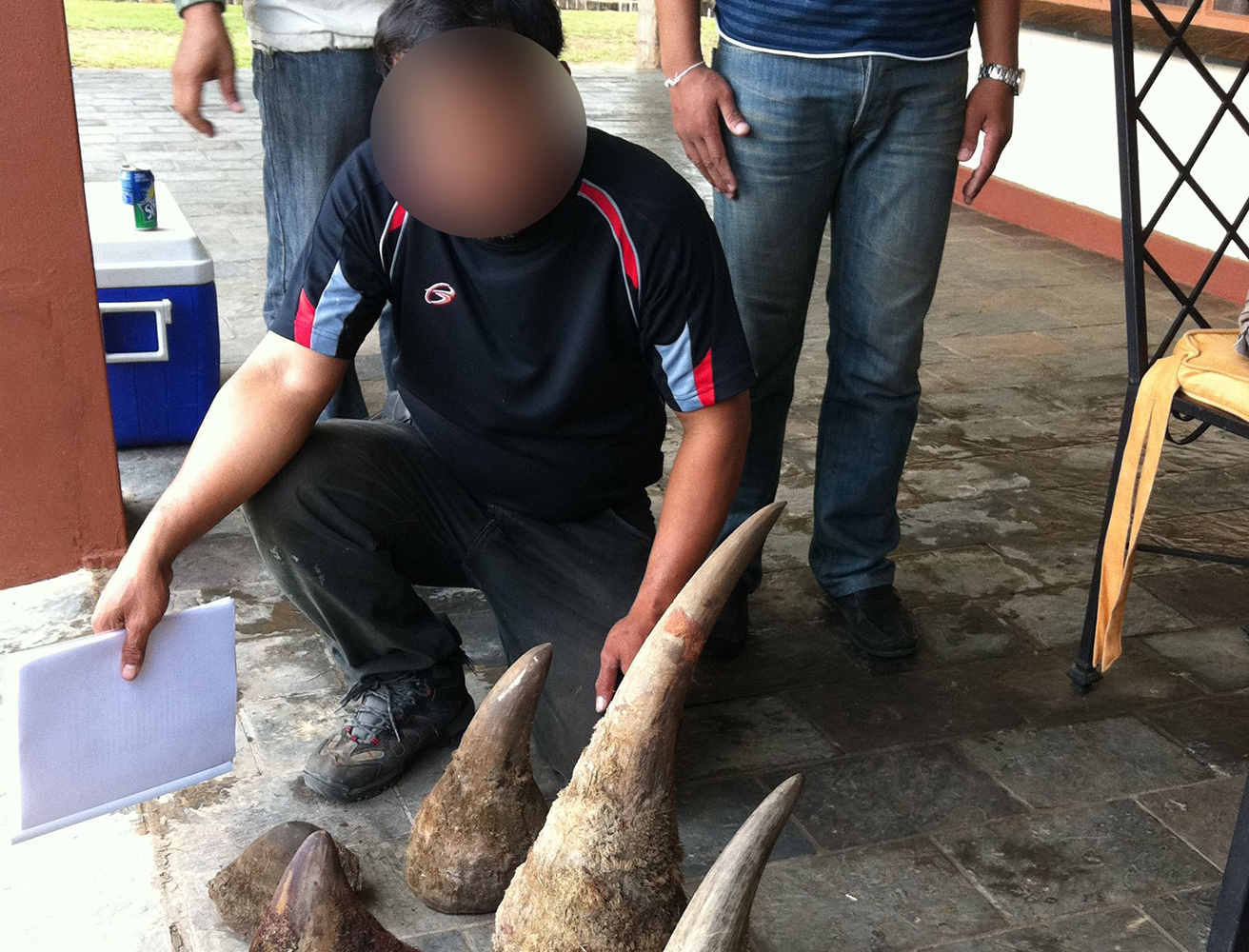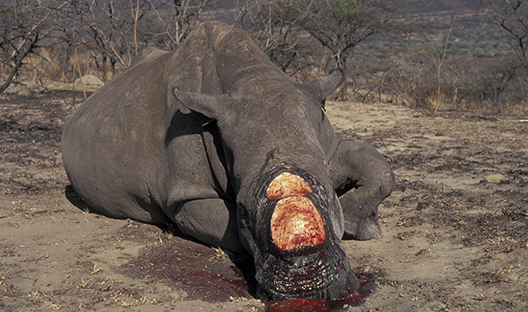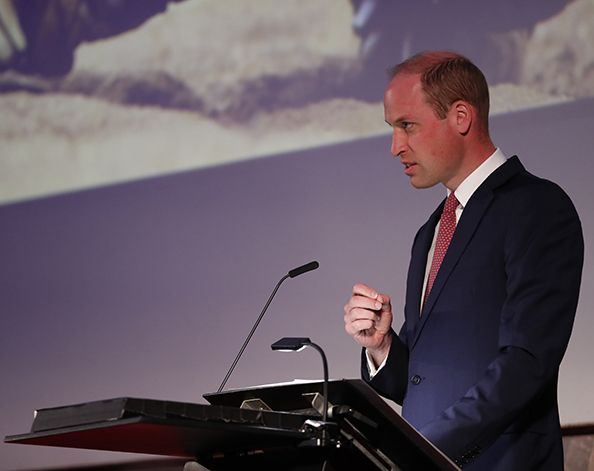Receive Focus insights straight to your inbox
Getting to the kingpins and disrupting illegal networks
The previous limited attention and resources given to understanding the financial flows linked to IWT means that most prosecutions are for so-called “predicated offences”, like poaching or possession of wildlife products.
As a result, offenders behind bars are low down the chain of command, and the kingpins of these highly organised and lucrative transnational crime syndicates, remain at large.
It was against this backdrop that SAMLIT formed an Expert Working Group in June 2020, to focus solely on the financial flows of IWT. In a nod to the power of public-private partnership, the EWG drew members from financial institutions, money remitters, law enforcement and prosecuting authorities.
The new relationships and networks made as a result of the SAMLIT working group saw a breakthrough in late December last year when a staggering 24 rhinos were poached in 48 hours.
"It takes a network to catch a network, and we've learnt that by joining forces and communicating through legal frameworks, we can be much more effective than by operating in silos."
Gerald Byleveld, Investec's head of financial compliance & head of SAMLIT's illegal wildlife trade working group.
READ MORE | Combatting illegal wildlife trade: Banks take up the challenge
With increased knowledge, effective coordination between financial institutions and law enforcement, and identifying red flags that could be associated with IWT, it’s hoped that this breakthrough will be one of many in the future.
“Collaboration is the only way to fulfill SAMLIT’s objectives to increase the efficiency and effectiveness in combating financial crime," said SAMLIT Chair, Adv Xolisile Khanyile. Before these arrests were made she spoke of what could be possible, which to some extent has come to fruition, "We are also encouraged, as this report proves what is possible in the future.”

Rhino horn being sold online by a member of a Vietnamese wildlife trafficking network operating in South Africa. Photo courtesy of Julian Rademeyer - Director of the Organised Crime Observatory for East and Southern Africa at the Global Initiative Against Transnational Organised Crime
Unprecedented carnage, receives unprecedented response
Having seen a drop off in poaching during Covid lockdowns, there was a huge spike in December 2021. Investec was alerted to the sudden increase via its partnership with conservation NPO, Care for Wild.
Now on a first-name basis, and armed with his direct number, Byleveld called Colonel Johan Jooste, national section commander of Wildlife Trafficking at the Hawks and alerted him to the alarming surge.
Jooste then swiftly implemented a strategic operation that included an increase in the monitoring of airports and harbours. This then led to the seizure of horns before they could exit SA, and there have been multiple arrests both here and abroad.
"It's like a relay against the trafficking syndicates. You have to be one step ahead of them. Our job is not done with seizures and arrests. That's not the end of the investigation, but the start of the financial investigation," said Jooste.
He goes on to explain that the recent sentencing of Ping Wu to five years' imprisonment for money laundering linked to IWT is a significant example of the success of adding financial crimes to wildlife charges.
SAMLIT Report lauded internationally as model to emulate
After eighteen months of hard work, an in-depth report aimed at understanding the financial flows associated with illegal wildlife trade (IWT) was released by the South African Anti-Money Laundering Task Force (SAMLIT).
Valued at anywhere between $7- and $23 billion per annum, IWT is quoted by the World Economic Forum as one of the most profitable criminal enterprises worldwide, alongside arms dealing, drugs and human trafficking, yet it lacks prominence as a financial crime.

What you can learn from the report
- Profiles and behaviours of those typically associated with wildlife crimes in SA
- Typologies on how criminals use the financial system
- Rand-based transaction values observed in criminal behaviour
- Methods and laundering tactics, and its increased level of sophistication as criminals move up the supply chain
- Business accounts which feature no business-related expenses (such as salaries or tax), while personal accounts of actors show no salary credits, living expenses or debit order payments, with funds often moving quickly in and out of accounts
- How front companies, or networks of front companies, and enablers were used to introduce funds into the financial system, as well as the co-mingling of funds between business and personal accounts
- The use of cash, casino chips, barter trade and vouchers to evade the formal financial system.

South Africa at the epicentre of IWT
Africa is one of the world’s richest suppliers of IWT, and South African plays a devastating role in being both a source and transit country for the trafficking of illegal wildlife products every year.
The most popular products originating in the country include rhino horn, abalone and pangolin, with ivory being moved through South Africa in transit to the East.

By collaborating to identify suspicious transactions, and exposing networks when perpetrators use the financial system, we can preserve SA’s rich heritage by bringing criminals to book.
Rhino horn
Most of the illegal rhino horn entering the market originates in South Africa, which holds approximately 80% of the world’s last remaining rhino. Methods of smuggling haven't been sufficiently exposed. Most incidents happen in Kruger National Park. Traffickers exploit legal loopholes for the import & export of trophies.
Pangolin
Pangolins are currently the most trafficked wild animal. leading non-governmental organisation, TRAFFIC, identified China and the United States of America to be the most common destinations for international pangolin trafficking, while Europe was identified as an important transit hub for African pangolins.
Abalone
Abalone is easily smuggled out of SA because of its porous borders with neighbours. Hong Kong forms the epicentre of international trade, importing shipments from South Africa, Australia, Indonesia and Japan. China and Vietnam are growing as secondary markets. Abalone is often disguised as potatoes in bags.
Taking advantage of discrepancies in domestic protection
In some countries, wildlife laws only protect animals indigenous to their jurisdictions, so wildlife or plant products originating from other countries can be moved legally.
This creates a haven for traffickers to use these destinations as transit hubs.
Routes used by other illicit networks are also used for wildlife trafficking, where it is often found together with weapons or drugs. In some instances, goods are bartered as payment (e.g. the sale of illegal wildlife for drugs) making it very difficult to trace illicit activity unless it is picked up by public officials at ports of entry or exit.
Criminals not operating alone
Syndicates frequently rely on a network of complicit officials, including customs officials, immigration, or port personnel, across source, transit and destination countries in order to avoid detection.
What was striking were the views expressed by contributors to this research as to the simplicity and ease with which both wildlife and financial crimes are committed. States the report.
It continues: "The extent to which front companies are implicated in IWT crimes is alarming, especially those linked to import and export activity and cash-intensive businesses."
Collaboration is at the heart of the report's success
SAMLIT was established in December 2019 as a collaborative public-private partnership between the regulatory authorities, represented by the Financial Intelligence Centre (FIC), and the Prudential Authority of the South African Reserve Bank, and domestic and international banks registered in South Africa.
SAMLIT provides a platform for members to share and exchange information centrally, to ensure that necessary steps can be taken to prevent, detect, investigate, and remediate priority crimes in the financial sector.
Globally these types of partnerships are recognised as the most effective means to investigate and prosecute financial crimes, and this recent report is gaining mention in international circles for its groundbreaking collaboration.
"The work SAMLIT's expert working group did on IWT is a leading example of a country’s response to the recommendations of the Financial Action Taskforce," said David Fein, Chair of the United for Wildlife Financial Task Force.
South African report hailed as example to follow
The work of SAMLIT has been commended by His Royal Highness, The Duke of Cambridge Prince William in his role as President of the Royal Foundation’s United for Wildlife, which has supported the expert working group.
In a letter to SAMLIT, Prince William wrote: “This report and related initiatives by SAMLIT and the expert working group are great examples of how – by bringing the public and private sectors together – we can deliver a significant blow to the growing illegal trade in wildlife that is such a threat to our planet."

I hope other countries will follow the leadership and commitment shown by our friends in South Africa, and I look forward to our continued partnership.
About the author

Caroline Edey-van Wyk
Brand Editor
Colloquially known as Investec’s “storyteller,” Caroline curates and produces all the content that underpins Investec's Out of the Ordinary brand promise. She works across the business but specialises in the areas of Sustainability, CSI, Sponsorships and HR. Caroline holds a Bachelor of Journalism degree in Political Science and Broadcasting - cum laude. Before she joined Investec she was a broadcast journalist at Sky News and eNCA.




